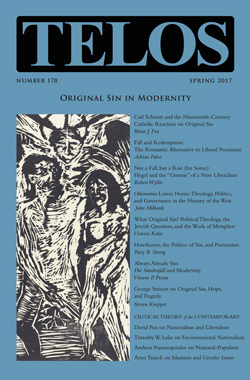At the beginning of his 1961 study The Death of Tragedy, George Steiner claimed that Christian “optimism” contributed to the demise of tragic drama in modernity. The ensuing chapters of The Death of Tragedy actually offer a more nuanced account, though, in which Steiner finds tragic potential in the doctrine of original sin. In subsequent essays, Steiner has doubled down on his claim that tragedy must be bleak. Indeed, he now holds up an ideal of hopeless “absolute tragedy.” In these later writings, Steiner has also continued to show interest in original sin, even claiming in a 2004 essay that original sin is the core of tragic art.
|
This article develops new empirical perspectives on the growing gender policy and gender role clash of civilizations now looming ahead in Western countries. The very same European governments that welcomed hundreds of thousands of migrants from countries with what the Muslim feminist Ziba Mir-Hosseini called “compulsory dress codes, gender segregation, and the revival of cruel punishments and outdated patriarchal and tribal models of social relations,” are untiringly promoting gender mainstreaming, which is now a top priority for European Union policymakers. Western feminism is at a turning point. Will it share with large sections of the green and left political currents in the West the cowardly silence about the threat of Islamist totalitarianism and terrorism, or will it develop solidarity with Muslim feminism? In addition to its main focus on original sin in modernity, Telos 178 (Spring 2017) features a special section of topical writing, introduced here by Russell A. Berman, that continues our ongoing commitment to setting forth a critical theory of the contemporary. Telos 178 is now available for purchase in our store.
Carl Schmitt is frequently assumed to have primarily been a Catholic intellectual, or Christian political theologian, at least until becoming alienated from the Church in the mid-1920’s. The jurist’s book Political Theology is quite logically a main source of evidence for this standard interpretation of Schmitt’s intellectual biography. However, an assumption of Schmitt’s Catholic, or even simply Christian, bona fides serves more as a distraction in understanding the origins and contours of his early thought. This mistaken narrative hides the degree to which Schmitt’s brand of secular and proto-Hobbesian decisionism is contrary to the thought of his claimed forebears among nineteenth-century counter-revolutionary Catholic theorists. Is there any genealogical connection between Christian oikonomia and modern political economy? Originally the turning of polity into household and interpersonal “pastoral” rule was not sinister but an advance. Likewise the Christian doctrines of Trinity and Incarnation resolved rather than sustained aporias of the reserved versus the economizing deity. However, later developments with the Franciscans, Palamites, and Jansenists effectively undid this resolution, producing a new “gnostic” duality. Economic rule was now sundered from ethics in a fallen world seen as utterly depraved. The heterodox discourse and practice of political economy resulted. Telos 178 (Spring 2017) is now available for purchase in our store. |
||||
|
Telos Press Publishing · PO Box 811 · Candor, NY 13743 · Phone: 212-228-6479 Privacy Policy · Data Protection Copyright © 2024 Telos Press Publishing · All Rights Reserved |
||||








